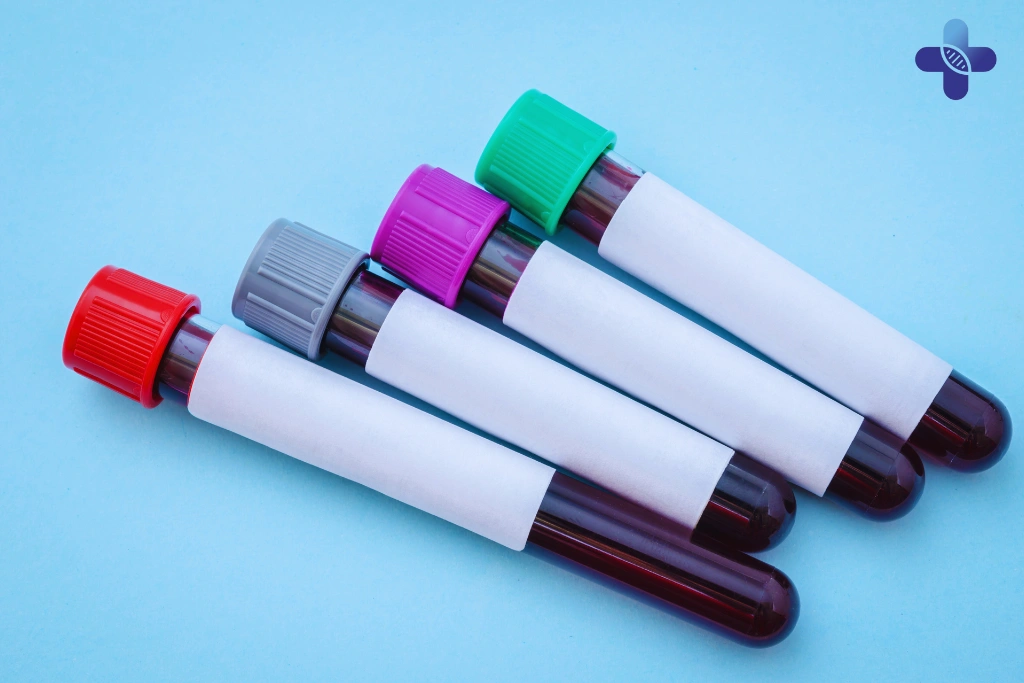Even in paradise, a moment of unprotected sex can carry consequences that last far beyond your holiday. Many sexually transmitted infections (STIs) show no symptoms at first, giving a false sense of security that delays testing and treatment. In this article, we’ll explore why early STD testing in Bali is essential—not just for your physical health, but for your emotional wellbeing, your relationships, and your peace of mind.

Delaying STD Testing? Why It’s a Risk You Can’t Afford in Bali
One moment of hesitation can lead to long-term consequences—learn why timely STD testing in Bali could protect your health, your partner, and your peace of mind.
In a place like Bali—where romance, spontaneity, and connection often flourish—it’s easy to get swept up in the moment. But what happens after the intimacy fades and questions start to surface? Many people delay getting tested after unprotected sex, hoping everything is fine simply because they feel fine. Unfortunately, this false sense of security allows silent infections like chlamydia, gonorrhoea, or HIV to spread unnoticed.
At Life Everyouth Clinic Bali, we’ve seen firsthand how late detection complicates treatment and puts both physical and emotional health at risk. Untreated STDs can lead to serious long-term conditions like infertility, chronic pain, or increased vulnerability to other infections. Worse yet, some people unknowingly transmit infections to others—amplifying both guilt and health risks.
Timely testing is not just about early diagnosis; it’s about reclaiming control, clarity, and confidence. With discreet, professional STD test packages available across Bali—including options for locals and tourists alike—there’s no reason to wait. Taking action today can protect your tomorrow.
The False Sense of Safety After Unprotected Sex
After an unprotected encounter, many people fall into a dangerous trap: assuming they’re in the clear simply because they feel fine. The absence of symptoms offers a false sense of relief, leading individuals to believe there’s no reason to worry. But the reality is, many sexually transmitted diseases (STDs) in bali—including chlamydia, gonorrhoea, and HIV—are often asymptomatic in their early stages, making it easy for infections to go unnoticed for weeks or even months.
This silence isn’t harmless—it’s risky. Without testing, these infections can continue to spread internally, damaging your reproductive organs, immune system, or other vital functions. Worse, people who unknowingly carry an infection may also transmit it to their partners, putting others at risk without realizing it. By the time physical symptoms do emerge—if they ever do—the infection may have already progressed to a more severe stage, requiring longer or more intensive treatment.That’s why waiting for symptoms is not a safe strategy. At Life Everyouth Clinic Bali, we often remind patients that “no symptoms” doesn’t mean “no infection.” Instead of relying on assumptions, it’s better to take charge of your health with early, proactive testing. Trust your instincts, and don’t let silence convince you everything is fine—your peace of mind is worth more than waiting.

Medical Risks of Delaying STD Testing
When you delay STD testing, you give infections time to spread—silently and aggressively. Many sexually transmitted infections begin in the genital area but don’t stay there for long. In women, untreated infections like chlamydia or gonorrhoea can ascend the reproductive tract, leading to Pelvic Inflammatory Disease (PID). PID is a serious condition that can result in infertility, chronic pelvic pain, or ectopic pregnancy, a potentially life-threatening complication. For men, similar delays can cause prostatitis, epididymitis, or long-term urethral inflammation that disrupts urinary and sexual function.
But the risks don’t stop at reproductive health. Many STDs, when left untreated, begin to affect the immune system, weakening the body’s ability to defend itself. Certain infections—especially syphilis, HIV, or herpes—can enter the bloodstream and cause systemic complications, including nerve damage, brain inflammation, or heightened vulnerability to other viruses. Some infections also increase your risk of contracting or transmitting HIV, even if you feel completely healthy.
At Life Everyouth Clinic Bali, we’ve treated countless patients who waited too long—either out of fear, denial, or lack of symptoms. What could have been a simple treatment turned into a months-long recovery. Early testing means catching infections at their most manageable stage, with faster healing, fewer complications, and greater protection for your future. Don’t let hesitation create a health crisis that could have been avoided.
Social and Emotional Consequences
Delaying STD testing doesn’t just put your physical health at risk—it often takes a toll on your mental and emotional well-being. After an unprotected encounter, many people find themselves consumed by worry: “What if I have something?” “What if I passed it on?” These thoughts can trigger sleepless nights, anxiety, and guilt, especially if you’re in a committed relationship or exploring new intimacy with someone you care about.
The psychological burden of uncertainty can strain communication, trust, and emotional connection. Some people avoid intimacy altogether, fearing that they might unknowingly infect a partner. Others may keep silent, distancing themselves emotionally out of shame or fear of judgment. These silent struggles often go unnoticed—but they affect your confidence, sense of safety, and overall mental health more than you may realize.
At Life Everyouth Bali, we’ve seen how testing brings more than just medical clarity—it brings emotional relief. Knowing your status allows you to make informed, honest decisions about your health and relationships. Whether your results are negative or point to something treatable, taking that step is an act of self-respect and compassion—for both yourself and those you care about.
The Importance of Timely Testing
Each sexually transmitted infection (STI) has a window period, the time between exposure and when a test can reliably detect the infection. Testing too early may result in false negatives, while waiting too long can allow complications to develop. Knowing when and what to test is critical.
HIV
HIV in bali is best detected using a 4th generation test, which identifies both antibodies and antigens. The ideal time to test is 14 to 28 days after unprotected sex. Testing earlier than 14 days may not catch the infection, but delaying too long increases the risk of unknowingly transmitting it to others. At Life Everyouth Clinic Bali, our rapid HIV test offers quick, confidential results and professional guidance on repeat testing if needed.
Chlamydia and Gonorrhoea
These two bacterial infections are among the most common and often show no symptoms. The ideal detection window using PCR testing is between 5 and 7 days post-exposure. Testing earlier may yield inaccurate results, while waiting too long can allow the bacteria to spread to the reproductive tract. If detected early, both infections are easily treated with antibiotics.
Curious about the most common infections and warning signs to watch for? Read our article on Sexually Transmitted Infection (STI) in Bali to learn how to recognize the risks and protect yourself early.
Syphilis
Syphilis in bali is a complex infection with multiple stages. Blood tests like VDRL and TPHA become accurate after 3 to 6 weeks of exposure. This is because the body takes time to develop detectable antibodies. Left untreated, syphilis can lead to neurological and cardiovascular complications. Our Comprehensive and Premium Intimate Care Packages at Life Everyouth Clinic include this essential test.
Herpes (HSV-2)
Herpes Simplex Virus (type 2) in bali is usually detected via IgM antibody tests, which become reliable around 7 to 21 days after exposure. Symptoms may include blisters or itching, but many carriers experience no signs at all. Early detection can help manage outbreaks and prevent transmission—especially with supportive treatment options available at our clinics.

Where to Get Reliable STD Testing in Bali
After unprotected sex, the best thing you can do is take timely, informed action. At Life Everyouth Clinic Bali, we offer discreet, professional, and non-judgmental STD testing services for both locals and international visitors in bali. Whether you’re staying in Ubud, Sanur, Jimbaran, or Seminyak, our clinics are conveniently located and staffed by experienced, English-speaking medical teams who prioritize your comfort and confidentiality.
We provide both in-clinic appointments and home visit options, so you can get tested in the setting that feels safest to you. Our services cover everything from basic screening to advanced testing, with clear explanations and fast, secure results. For those needing peace of mind after a single encounter, our Basic STD Test Package includes doctor consultation and an HIV rapid test, starting at IDR 800.000 for local/KITAS holders.
If you require broader screening for gonorrhoea, trichomonas, candida, or chlamydia, we recommend the Medium, Premium, or Essential Packages, which incorporate additional diagnostic tools like PCR testing—ideal for those testing within 5–7 days post-exposure. For more complex needs, our Comprehensive Package includes HIV, syphilis, herpes, and hepatitis B testing, while our Advanced Sexual Health and Premium Intimate Care Packages offer full panels with PCR-based detection for ureaplasma, mycoplasma, chlamydia, and more, ranging from IDR 2.388.000 to 4.688.000.You can also enhance your screening with optional add-ons like urinalysis or genital swab collection, depending on your symptoms or exposure history. At Life Everyouth, we don’t just provide test results—we support your entire care journey, ensuring you get answers, clarity, and personalized medical advice. Because when it comes to sexual health, early action isn’t just protection—it’s empowerment.

Conclusion Delaying STD Testing? Why It’s a Risk You Can’t Afford in Bali
Delaying STD testing may feel like a way to avoid stress—but in reality, it only postpones the clarity you need to protect yourself and those around you. Infections that go undiagnosed don’t just disappear. They spread, evolve, and become harder to treat, leading to complications that affect your body, your relationships, and your mental well-being. Whether you feel symptoms or not, early testing is always the safest, smartest decision.
At Life Everyouth Clinic Bali, we make that decision easier by offering a full range of STD testing packages—tailored for different needs, budgets, and timelines. From rapid HIV testing to advanced PCR panels, we’re here to provide accurate answers and non-judgmental care. Don’t wait for symptoms or uncertainty to take control. Take charge of your health today—and let peace of mind be the real souvenir you bring home from Bali.
Frequently Asked Question Delaying STD Testing? Why It’s a Risk You Can’t Afford in Bali
How soon should I get tested after unprotected sex?
The right timing depends on the type of infection. Some tests, like gonorrhoea and chlamydia (PCR), can be done as early as 5–7 days after exposure. Others, such as HIV (4th generation test), are more accurate after 14–28 days, while syphilis (VDRL/TPHA) may take 3–6 weeks to become detectable. At Life Everyouth Clinic Bali, our doctors can guide you based on your exposure timeline and recommend the most suitable test for accurate results.
What happens if I wait too long to get tested?
Delaying testing increases the risk of complications like Pelvic Inflammatory Disease, infertility, or long-term infections that affect your immune system or organs. It also raises the chance of unknowingly transmitting infections to others. Many STDs are easily treatable when detected early—so the sooner you test, the easier and safer the treatment process will be.
Are there STDs with no symptoms at all?
Yes, many STDs—including chlamydia, gonorrhoea, herpes, and HIV—can be completely asymptomatic for weeks or even months. Just because you feel fine doesn’t mean you’re not carrying an infection. This is why routine testing is so important, especially if you’ve had unprotected sex or multiple partners. It’s the only way to know your status for sure.
Can I get tested if I have no symptoms?
Absolutely—and you should. Testing without symptoms is not only normal, it’s responsible. At Life Everyouth Clinic, many of our patients come in proactively to check their status, especially before starting a new relationship or after travel. Our packages are designed to make this process discreet, quick, and stress-free, even if you’re feeling perfectly well.
Is it normal to feel anxious about getting tested?
Yes, completely. It’s natural to feel nervous about both the process and the results. But most people feel relieved and empowered after testing—no matter the outcome. At Life Everyouth, we provide confidential care, empathetic consultations, and clear communication to help you feel supported every step of the way.
What if I test negative but still feel worried?
If you test too early, you might be within the window period, when the infection is present but not yet detectable. If this is the case, your doctor may recommend a repeat test after a few weeks to confirm results. We also offer follow-up consultations and guidance to ensure you’re never left uncertain about what to do next.
Can one unprotected encounter really cause infection?
Yes—one single exposure is enough to transmit an STD. This includes vaginal, anal, or oral sex. The idea that it “won’t happen just once” is a dangerous myth. That’s why testing—even after one encounter—is a crucial step to protect both yourself and any future partners.
What should I do while waiting for the right time to test?
Avoid further unprotected sexual contact, as you may unknowingly transmit an infection. Monitor your body for any unusual symptoms like discharge, itching, or sores—but remember that some infections show no signs. In the meantime, you can book a consultation at Life Everyouth to discuss your situation and receive personalized medical advice.
Where can I get affordable STD testing in Bali?
Life Everyouth Clinic Bali offers a range of STD test packages starting from IDR 800.000 for locals or KITAS holders. Packages range from basic screening to advanced PCR testing, with options tailored to your risk level, symptoms, and timing. Our team will help you choose the right one for your needs—quickly, confidentially, and respectfully.
Is home testing available?
Yes. If you prefer privacy or are staying at a hotel or villa, Life Everyouth offers doctor home visits for STD testing. It’s safe, discreet, and convenient—perfect for travelers, expats, or anyone who wants medical care brought to their doorstep.
